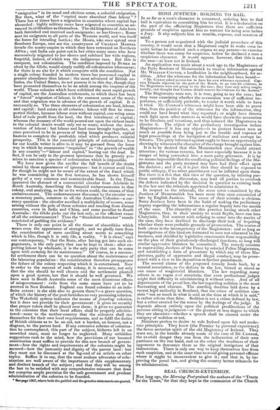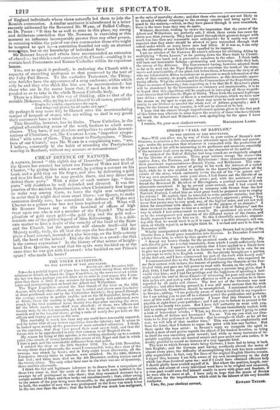REAL CHURCH-EXTENSION.
NOT long ago, the Morning Post praised the authors of the "Tracts for the Times," for that they kept in the communion of the Church
of England individuals whose views naturally led them to join the Romish communion. A similar sentiment is adumbrated in a letter recently addressed by the Reverend Mr. WARD, of Balliol College, go Dr. POSEY "It may be as well to state in this place, my strong .and deliberate conviction that Mr. Newman is exercising at this raotnent an influence incomparably greater than any other person,
in retaining within the pale of our own communion those who might be tempted to quit it,—a conviction founded not only on abstract reas4ngs, but on my knowledge of individual facts." Sir —ROBERT INGLIS and others have recommended an extension of churches ; but this is a real extension of the Church—enabling it to contain both Protestants and Roman Catholics within its capacious bosom.
This, not to speak it profanely, is endowing the Church with a capacity of stretching analogous to that possessed by the tent of the Fairy Pan i Banou. To the exclusive Protestant, the Thirty- nine Articles have the appearance of a snug enclosure, within which only he and they who think like him can be accommodated : but those who are in the secret know that, if need be, it can be ex- panded so as to take in the whole Roman Catholic body.
There is a liberality in this way of thinking, akin to that of the amiable Mokanna, who, trying to suit himself to all tastes, provided "buns for youths, experiences for sages,
And wings and glories for all ranks and ages."
Or perhaps it may more fitly be likened unto the accommodating temper of keepers of stores, who are willing to deal in any goods their customers have a mind to.
This liberality, however, has its limits. These Catholics, in the
original all-embracing sense of the word, hesitate to admit some classes. They have, if not absolute antipathies to certain denomi- nations of Christians, yet, like CHARLES LAMB, "imperfect sympa- thies" with some of them. They demur to Presbyterians. "Mem- bers of our Church," says Mr. WARD in a complaining tone, "are, I believe, constantly in the habit of attending the Presbyterian worship in Scotland, without any censure or remonstrance."



























 Previous page
Previous page